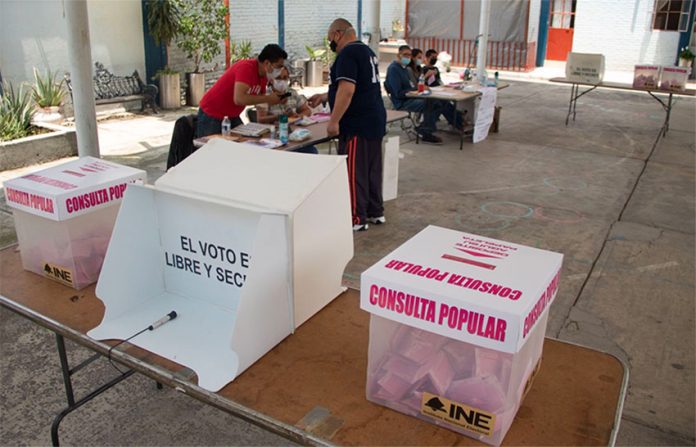An overwhelming majority of citizens who cast ballots in a referendum on Sunday voted in favor of investigating Mexico’s five most recent presidents for crimes they might have committed in office. But participation was well below the level required to make the vote binding.
According to a “quick count” by the National Electoral Institute (INE), between 89.4% and 96.3% of participants voted yes in response to a convoluted question drawn up by the Supreme Court that asked whether decisions taken in the past by “political actors” should be subjected to “actions of clarification” aimed at guaranteeing justice and the rights of possible victims.
The INE said that turnout was 7.1% to 7.7% of registered voters, less than one-fifth the 40% participation, or approximately 37.5 million voters, required to make the vote valid.
Just 1.4% to 1.6% of participants voted no while 2.2% to 9.2% cast invalid ballots, the INE said.
Despite the low turnout, the INE declared the referendum a success. “The referendum is successful because it’s the first with certainty and legality,” said institute president Lorenzo Córdova.
He said that the vote was carried out “with civility” and thanked the officials who made it possible as well as President López Obrador, who proposed the referendum but didn’t cast a ballot. “We should all feel proud,” Córdova said.
López Obrador, whose government has staged its own consultations to gauge public opinion on infrastructure projects including the previous government’s Mexico City airport and a brewery in Baja California, said Monday that he was happy with the results and described the referendum as “transcendent.”
“I want to congratulate everyone who participated in the citizens’ consultation yesterday, which was the first constitutional referendum that has been carried out in the history of our country,” he said at his regular news conference.
The president previously declared that he wouldn’t vote in the referendum because revenge is not his strong suit and he prefers to look to the future rather than dwell on the past. He has nevertheless blamed past presidents for all manners of problems Mexico faces today, including insecurity and inequality.
López Obrador is set to face voters himself next year as he subjects himself to a so-called “revocation of mandate” vote to determine whether citizens want him to remain as president for his full six-year term or leave office early.
Sergio Gutiérrez Luna, a deputy with the ruling Morena party and its representative at the INE, said lawmakers will take an initiative to Congress to change the law and allow referendums to be held the same day as elections in order to boost participation. Mexicans went to the polls to vote in municipal, state and federal elections just eight weeks before Sunday’s consultation but the law forbade the concurrent staging of a referendum.

Gutiérrez renewed Morena’s attack on both the INE – the party claims the electoral institute sabotaged the vote by not promoting it sufficiently and only setting up one-third the number of voting points it set up at last month’s elections – and opposition political parties, which called for citizens to boycott the referendum.
The Institutional Revolutionary Party (PRI) and the National Action Party (PAN) – parties which the five most recent ex-presidents represented – sought to sabotage the referendum because the no vote never had a chance of winning, he said.
“Of 7.2 million people, 97% said yes to the trial of [past presidents] Fox, Peña, Calderón, Salinas [and Zedillo]. This referendum is successful, despite the attempt of sabotage by [INE] president Lorenzo Córdova and councilor Ciro Murayama,” Gutiérrez said.
In contrast, opposition parties characterized the vote as a failure. “Members of Morena: nine out of 10 Mexicans said no today to this circus, this farce and you – the worst government at the worst time,” said Víctor Hugo Sondón, PAN’s representative at the INE.
“The failure of the referendum showed once again that Mexicans are fed up with a government that hides in the past in order to not face up to the present,” PRI national president Alejandro Moreno wrote on Twitter.
José Woldenberg, a former president of the Federal Electoral Institute, INE’s predecessor, said before the vote was held that it was regrettable that the first national referendum staged by the INE didn’t have a clear question.
“It’s an indecipherable consultation; you only have to read the question to realize that what is being asked is smoke and nothing but smoke. This is a referendum that shouldn’t be held, that’s my conviction. It’s a shame that the first national level referendum is an indecipherable consultation,” he said.
The López Obrador administration had proposed asking citizens directly whether past presidents should be investigated and face trial for alleged wrongdoings but the Supreme Court rejected that plan in order to protect due process and the presumption of innocence.
Woldenberg, who described the Supreme Court’s question as “gibberish,” said he hoped future referendums would have clearer questions.
“I’m not against referendums, quite the contrary. I’m against this referendum because it’s whimsical, deceptive and indecipherable,” he said.
With reports from Milenio, El País and El Universal
